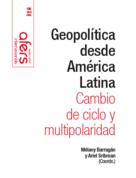Mi nuevo artículo con Sebastián Bitar de la Universidad de los Andes acaba de salir en la Revista CIDOB d’affers Internationals, una de las más reconocidas publicaciones de Relaciones Internacionales en España. Entitulado “Del consenso a la complejidad: relaciones interamericanas diversas y en transición”, el trabajo explora el panorama cambiante de las relaciones entre los Estados Unidos y América Latina. Forma parte de un número especial, con una variedad de contribuciones sobre la geopolítica vista desde América Latina, coordinado por Ariel Sribman Mittelman y Mélany Barragán.
Desde la crisis financiera de 2008, la política internacional ha sido alterada por una mayor difusión de recursos económicos y capacidades militares. Ello, para muchos, constituye una transformación radical que puede ser el fin de la hegemonía estadounidense en América Latina. Este artículo examina esta proposición comenzando por revisar el concepto de hegemonía que, en lugar de verse como una característica estructural, aquí se conceptualiza como una «hegemonía matizada», es decir, una red de relaciones asimétricas y jerárquicas. En este sentido, se observa no una sola transformación, sino la emergencia de un contexto hemisférico que vendría definido por la «asimetría diferenciada». Estados Unidos aún ocupa una posición central, pero su política exterior está marcada por la fragmentación subregional y la externalización de prioridades electorales. Al respecto, se exploran sus efectos a nivel subregional con un enfoque en las oportunidades y los desafíos que ello supone para los países latinoamericanos.


